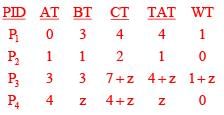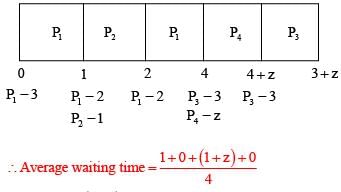Computer Science Engineering (CSE) Exam > Computer Science Engineering (CSE) Questions > Consider the following four processes with ar...
Start Learning for Free
Consider the following four processes with arrival times (in milliseconds) and their length of CPU bursts (in milliseconds) as shown below:

These processes are run on a single processor using preemptive shortest remaining time first scheduling algorithm. If the average waiting time of the processes is 1 millisecond, then the value of Z is ________.

These processes are run on a single processor using preemptive shortest remaining time first scheduling algorithm. If the average waiting time of the processes is 1 millisecond, then the value of Z is ________.
Correct answer is '2'. Can you explain this answer?
| FREE This question is part of | Download PDF Attempt this Test |
Verified Answer
Consider the following four processes with arrival times (in milliseco...

Gantt Chart:



|
Explore Courses for Computer Science Engineering (CSE) exam
|

|
Similar Computer Science Engineering (CSE) Doubts
Consider the following four processes with arrival times (in milliseconds) and their length of CPU bursts (in milliseconds) as shown below:These processes are run on a single processor using preemptive shortest remaining time first scheduling algorithm. If the average waiting time of the processes is 1 millisecond, then the value of Z is ________.Correct answer is '2'. Can you explain this answer?
Question Description
Consider the following four processes with arrival times (in milliseconds) and their length of CPU bursts (in milliseconds) as shown below:These processes are run on a single processor using preemptive shortest remaining time first scheduling algorithm. If the average waiting time of the processes is 1 millisecond, then the value of Z is ________.Correct answer is '2'. Can you explain this answer? for Computer Science Engineering (CSE) 2024 is part of Computer Science Engineering (CSE) preparation. The Question and answers have been prepared according to the Computer Science Engineering (CSE) exam syllabus. Information about Consider the following four processes with arrival times (in milliseconds) and their length of CPU bursts (in milliseconds) as shown below:These processes are run on a single processor using preemptive shortest remaining time first scheduling algorithm. If the average waiting time of the processes is 1 millisecond, then the value of Z is ________.Correct answer is '2'. Can you explain this answer? covers all topics & solutions for Computer Science Engineering (CSE) 2024 Exam. Find important definitions, questions, meanings, examples, exercises and tests below for Consider the following four processes with arrival times (in milliseconds) and their length of CPU bursts (in milliseconds) as shown below:These processes are run on a single processor using preemptive shortest remaining time first scheduling algorithm. If the average waiting time of the processes is 1 millisecond, then the value of Z is ________.Correct answer is '2'. Can you explain this answer?.
Consider the following four processes with arrival times (in milliseconds) and their length of CPU bursts (in milliseconds) as shown below:These processes are run on a single processor using preemptive shortest remaining time first scheduling algorithm. If the average waiting time of the processes is 1 millisecond, then the value of Z is ________.Correct answer is '2'. Can you explain this answer? for Computer Science Engineering (CSE) 2024 is part of Computer Science Engineering (CSE) preparation. The Question and answers have been prepared according to the Computer Science Engineering (CSE) exam syllabus. Information about Consider the following four processes with arrival times (in milliseconds) and their length of CPU bursts (in milliseconds) as shown below:These processes are run on a single processor using preemptive shortest remaining time first scheduling algorithm. If the average waiting time of the processes is 1 millisecond, then the value of Z is ________.Correct answer is '2'. Can you explain this answer? covers all topics & solutions for Computer Science Engineering (CSE) 2024 Exam. Find important definitions, questions, meanings, examples, exercises and tests below for Consider the following four processes with arrival times (in milliseconds) and their length of CPU bursts (in milliseconds) as shown below:These processes are run on a single processor using preemptive shortest remaining time first scheduling algorithm. If the average waiting time of the processes is 1 millisecond, then the value of Z is ________.Correct answer is '2'. Can you explain this answer?.
Solutions for Consider the following four processes with arrival times (in milliseconds) and their length of CPU bursts (in milliseconds) as shown below:These processes are run on a single processor using preemptive shortest remaining time first scheduling algorithm. If the average waiting time of the processes is 1 millisecond, then the value of Z is ________.Correct answer is '2'. Can you explain this answer? in English & in Hindi are available as part of our courses for Computer Science Engineering (CSE).
Download more important topics, notes, lectures and mock test series for Computer Science Engineering (CSE) Exam by signing up for free.
Here you can find the meaning of Consider the following four processes with arrival times (in milliseconds) and their length of CPU bursts (in milliseconds) as shown below:These processes are run on a single processor using preemptive shortest remaining time first scheduling algorithm. If the average waiting time of the processes is 1 millisecond, then the value of Z is ________.Correct answer is '2'. Can you explain this answer? defined & explained in the simplest way possible. Besides giving the explanation of
Consider the following four processes with arrival times (in milliseconds) and their length of CPU bursts (in milliseconds) as shown below:These processes are run on a single processor using preemptive shortest remaining time first scheduling algorithm. If the average waiting time of the processes is 1 millisecond, then the value of Z is ________.Correct answer is '2'. Can you explain this answer?, a detailed solution for Consider the following four processes with arrival times (in milliseconds) and their length of CPU bursts (in milliseconds) as shown below:These processes are run on a single processor using preemptive shortest remaining time first scheduling algorithm. If the average waiting time of the processes is 1 millisecond, then the value of Z is ________.Correct answer is '2'. Can you explain this answer? has been provided alongside types of Consider the following four processes with arrival times (in milliseconds) and their length of CPU bursts (in milliseconds) as shown below:These processes are run on a single processor using preemptive shortest remaining time first scheduling algorithm. If the average waiting time of the processes is 1 millisecond, then the value of Z is ________.Correct answer is '2'. Can you explain this answer? theory, EduRev gives you an
ample number of questions to practice Consider the following four processes with arrival times (in milliseconds) and their length of CPU bursts (in milliseconds) as shown below:These processes are run on a single processor using preemptive shortest remaining time first scheduling algorithm. If the average waiting time of the processes is 1 millisecond, then the value of Z is ________.Correct answer is '2'. Can you explain this answer? tests, examples and also practice Computer Science Engineering (CSE) tests.

|
Explore Courses for Computer Science Engineering (CSE) exam
|

|
Suggested Free Tests
Signup for Free!
Signup to see your scores go up within 7 days! Learn & Practice with 1000+ FREE Notes, Videos & Tests.























